Yoga For Depression: Does Yoga Really Help With Depression 2024?
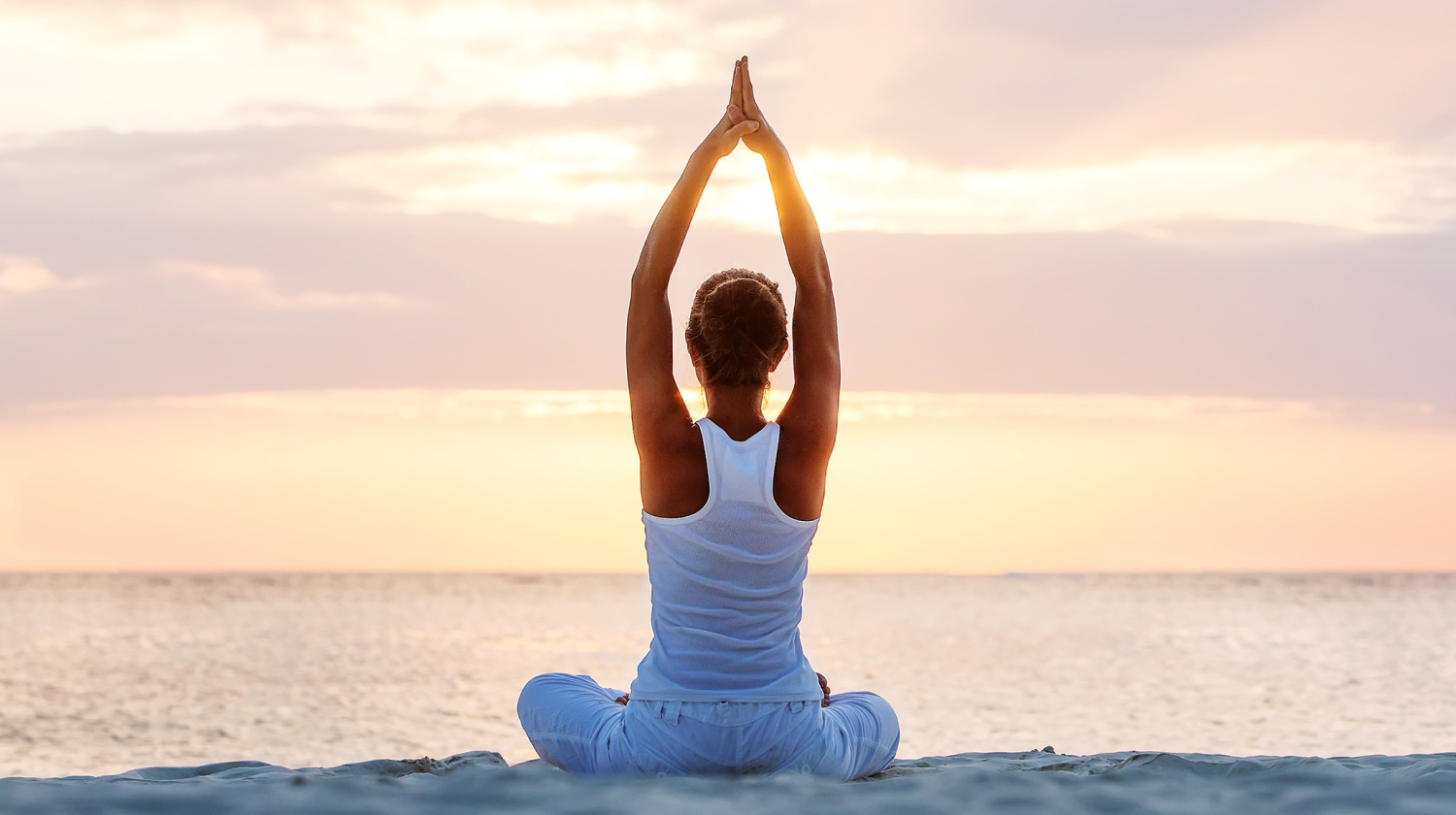
Historically, the practice of yoga[1] has always been considered a deeply spiritual discipline, one that combines meditation, deep breathing, and physical movement. Originating in India’s 5th and 6th centuries BCE, this sublime Eastern practice has exploded in popularity in recent years and continues to pack out gym studios across the globe.
There are many forms of yoga, including Iyengar, hatha, vinyasa, hot yoga, and ashtanga, to name a few forms. Together, they encapsulate a practice that has been scientifically proven[2] in recent years to strengthen the body and mind. From the horizontal corpse pose of the relaxing Yoga Nidra technique to the complex physicality of the power yoga-based Taraksvasana (handstand scorpion pose), there is a style to suit everybody. But less is currently known about yoga’s newest embodiment — yoga therapy[1] — a clinically proven approach to managing stress, anxiety, and depression.[3] Let’s find out more about it!
Does Yoga Help With Depression?
Many of us know that therapists (whether online or in-person) and prescribed medications offer effective interventions for mood disorders of all kinds (such as anxiety or bipolar disorder). Both can be critical for the 280 million or so people that sadly experience depression today.
But did you know that yoga therapy can now be added to this treatment list as a scientifically viable means of managing anxiety symptoms, mild and major depression, and other mood disorders?[4] In fact, science shows us clearly that integrating yoga into our daily lives can offer an excellent strategy for maintaining positive mental health.
A recent 16-week work-based study,[5] for example, reported significant improvements in mental health on anxiety and stress levels, feelings of well-being, depression, general psychological health, and insomnia of participants tested.
But how, specifically, can yoga affect our mental health so positively? Let’s take a closer look at the science behind the story.


Professional Therapy, Done Online
BetterHelp makes starting therapy easy.
Fill out a brief questionnaire and get matched with a licensed therapist under 48 hours. Get started today and receive a special 20% discount on your first month
How Yoga Helps With Depression
So how exactly can this ancient Indian practice improve our mental health?
The key to understanding the process is to look at how practicing yoga affects us biologically. First, participating in a yoga class or yoga group can help to regulate[6] our autonomic nervous system (a part of our body that plays a critical part in managing our stress response, and also controls heart rate, breathing, and digestion).
Practicing yoga also positively regulates parasympathetic nervous system[7] activity (which helps to relax our body, countering feelings of stress and anxiety). Additionally, by increasing gamma-aminobutyric acid activity, yoga can positively improve emotional mood[8] and enhance sleep quality. Deficiencies in this amino acid, which acts as a neurotransmitter, are linked directly[9] to depressive symptoms, worsened mental health, and depressive and anxiety disorders.
Studies also show that joining a yoga class to practice your asanas and breathing techniques with a qualified yoga instructor can decrease[10] a range of inflammatory markers in the body which have been linked to mental health disturbances. And the benefits of yoga practice may be even more pronounced when combined with anxiety-lowering supplements.
Yoga Poses For Depression
There are so many forms of yoga out there that it can be hard to know which one to choose. Generally, we recommend styles that include hatha yoga, either singularly or as part of the form chosen, which offers a rejuvenating blend of asanas (postures), dhyana (meditation), and pranayama (mindful breathing) that combine[11] to relieve anxiety disorders, reduce depressive symptoms and promote mindfulness meditation.
We’ve taken out the guesswork to show you five great asanas, or yoga poses, that we recommend for a relaxing home (or gym-based) workout any day of the week.
Savasana (Corpse Pose): Lie on your back with your arms at your sides, palms facing up. With your eyes closed, let your body relax, breathing slowly and calmly. Remain in this position for four to five minutes.
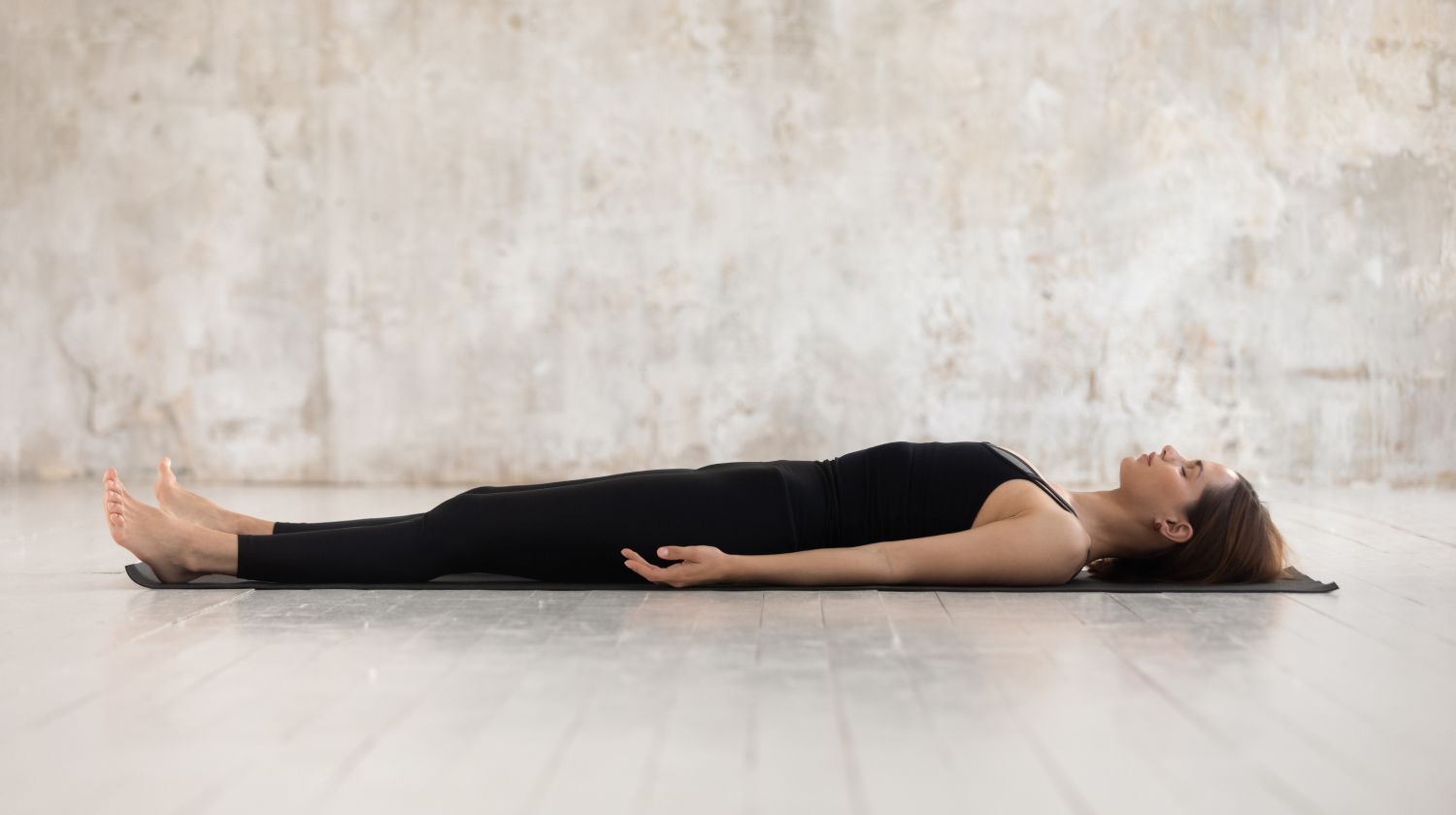
Balasana (Child’s Pose): Kneel on your mat, and sit back on your heels. From there, bend forward from the waist so that your chest is resting on your thighs. Relax your shoulders and neck so that your forehead rests on the mat. Then, closing your eyes, with your palms upward close to your feet, focus on deep, relaxed breathing.
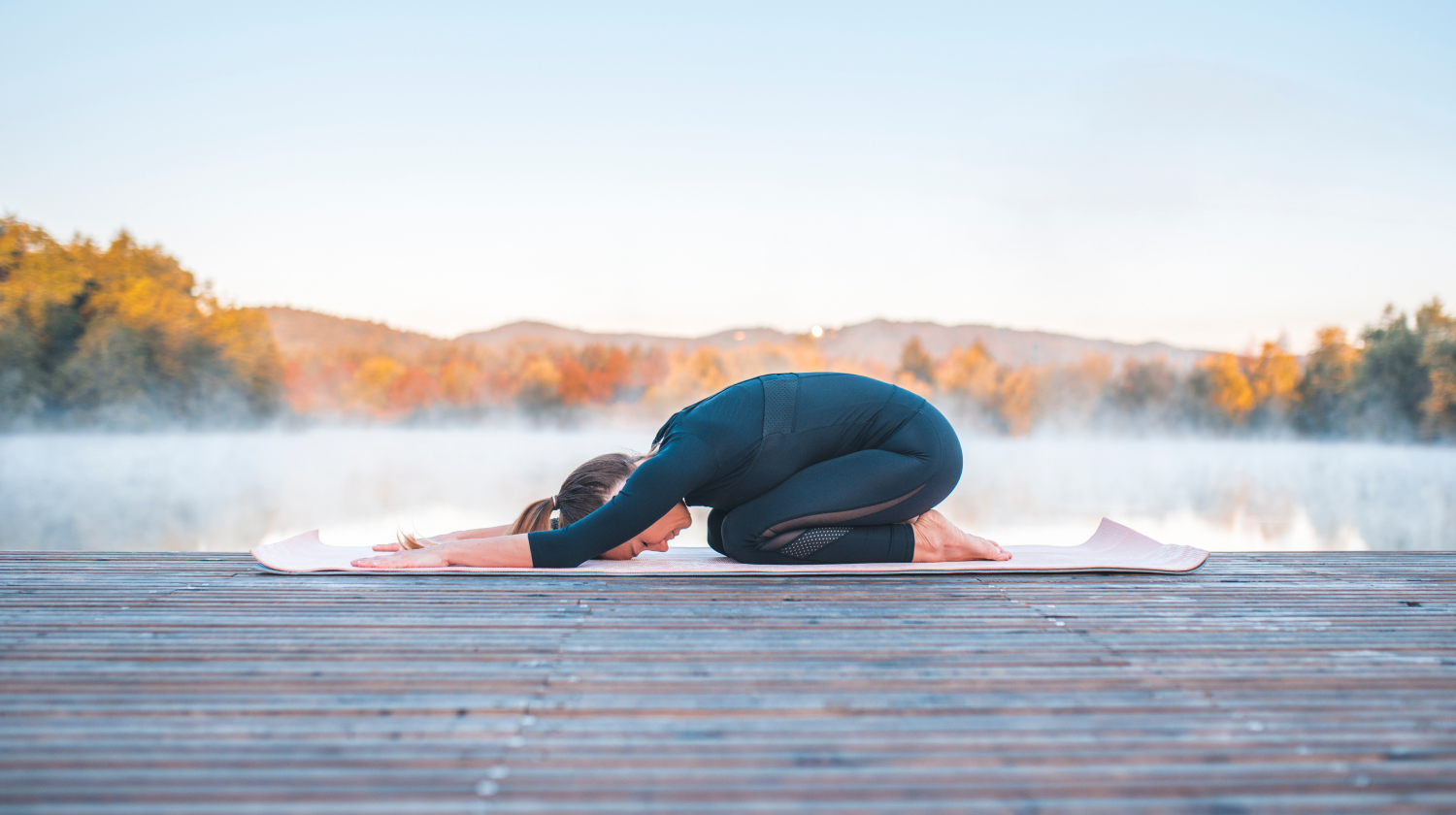
Pavanamuktasana (Wind Relieving Pose): Lie on your back, and gently bring your knees into your body, hugging them with your arms. With eyes closed, and concentrating on relaxed breathing, gently release your left leg so that it is extended on the mat. After 1-2 minutes, bring your left leg back and extend your right leg. Then finally, return both legs to the starting position, hugging them into your body.
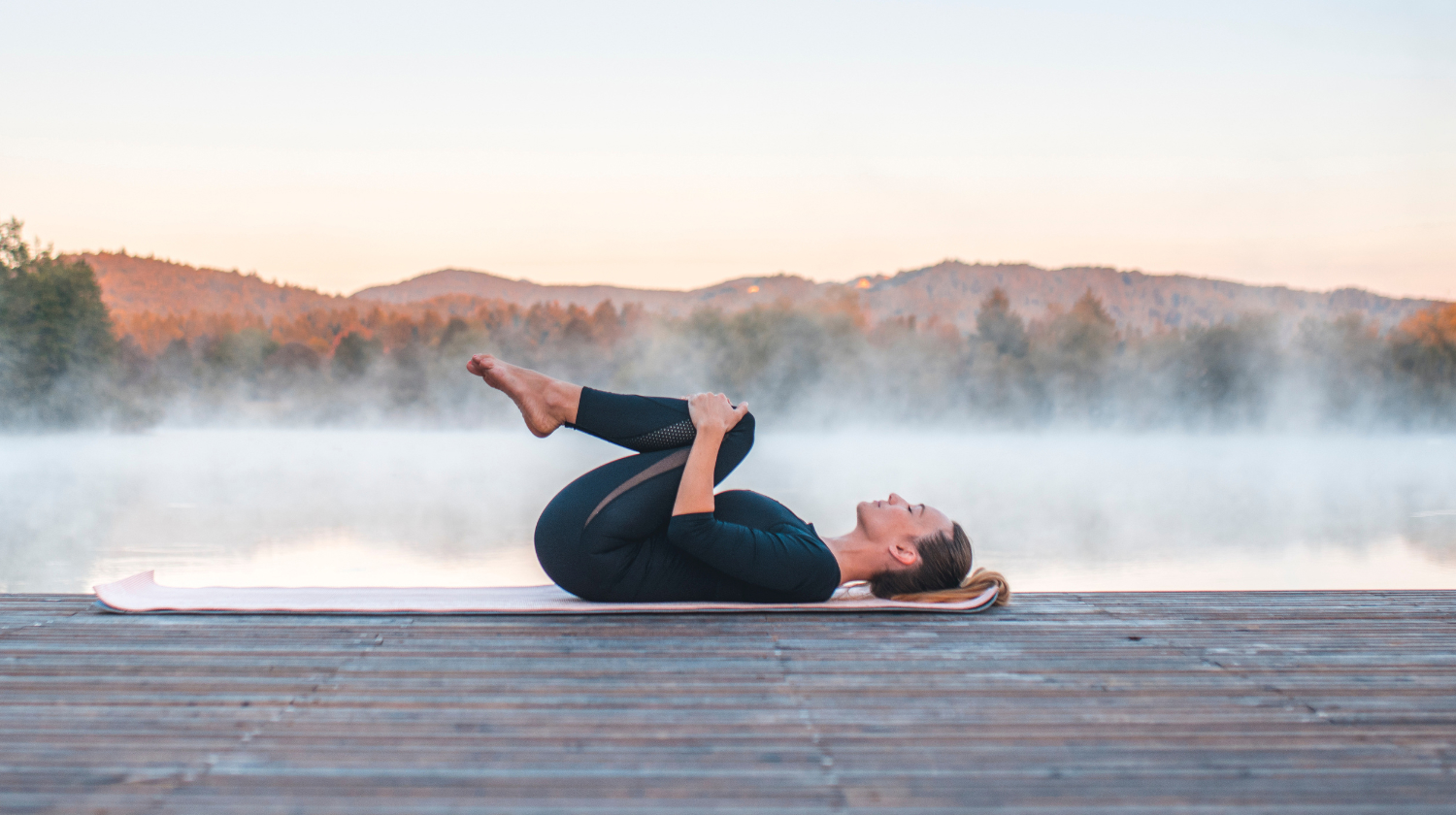
Viparita Karani (Legs Up The Wall Pose): Lie down with your backside touching the edge of a wall. Then extend your legs so that they are elevated flat against the wall. Let your arms fall gently to the sides of your body on your mat, and close your eyes, concentrating on slow, deep breaths.
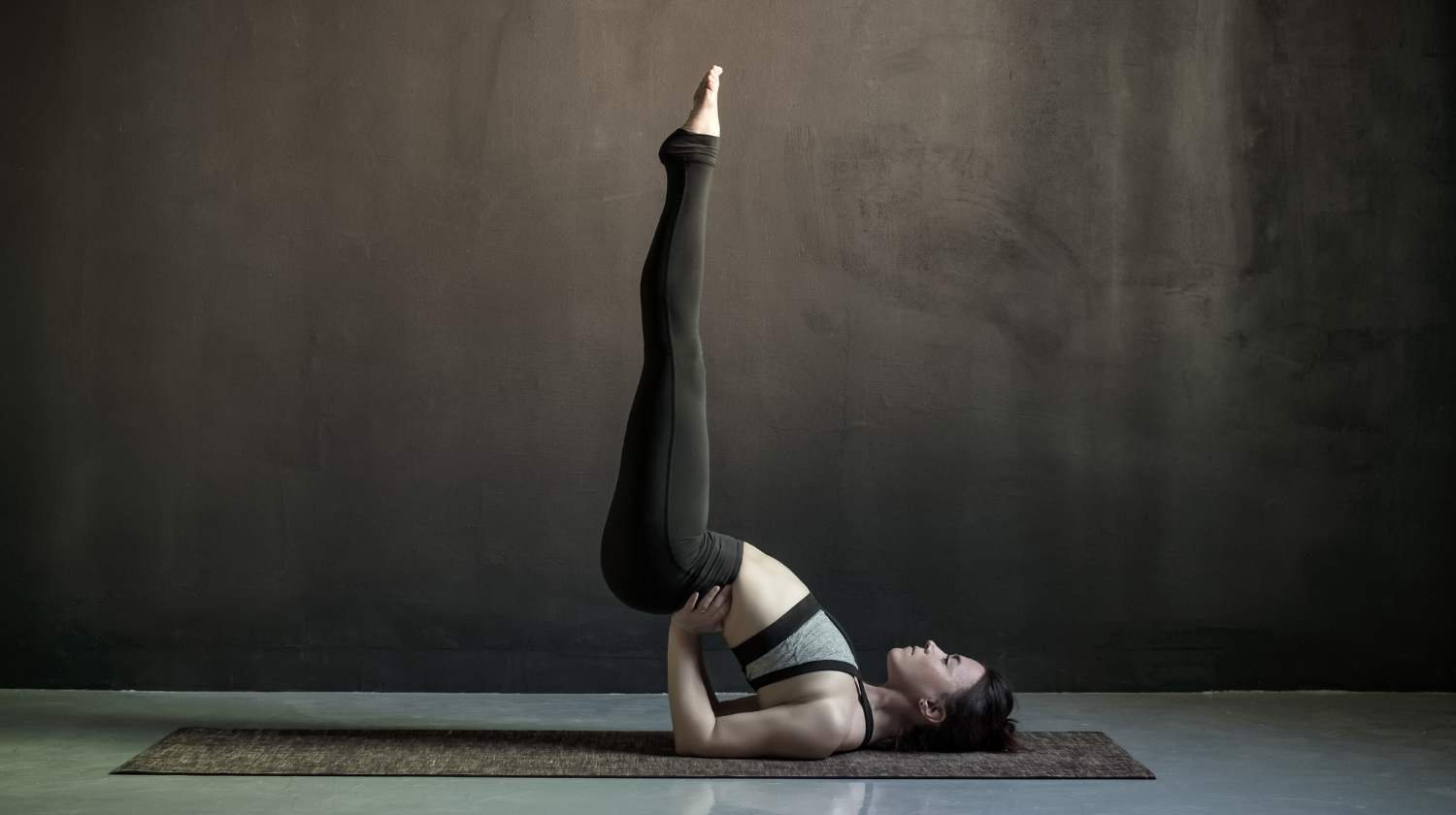
Baddha Konasana (Cobbler’s Pose): A great pose to open up the hips and groin. Sit on your mat, legs outstretched. Then draw your knees toward your body, and place the soles of your feet together so that your knees fall outward and your heels are as close as is comfortable to your body. With your spine straight, gently hold your toes, and with your eyes closed, focus on slow, relaxed breathing.

Pros And Cons Of Yoga Therapy
Excited to try yoga therapy? We don’t blame you. After all, there are many pros. For a start, there is no age limit when it comes to enjoying the benefits of a yoga intervention. A recent systematic review[12] reported a wide range of mental health benefits in yoga-practicing seniors, while impressive stress and anxiety-focused benefits were also reported in children[13] who practice yoga.
Yoga classes can also offer an alternative or adjunct treatment to medication for mental illness. A study[14] of the positive therapeutic and neurotropic effects of yoga on depression, for example, reported that yoga offered mental health benefits that antidepressants did not (while sidestepping the potentially adverse side effects of pharmaceutical medication).[14]
Similarly, a recent pilot study reported a significant positive effect of yoga[15] as a therapeutic approach for treating depression, finding Iyengar yoga to be an effective intervention[16] for depression and suicidal ideation. Yoga can successfully treat unipolar depression[6] and can reduce depressive symptoms.[17] Studies reported yoga as an effective standalone and adjunct treatment[18] for individuals, depending on the nature of their anxiety, mood, or depressive disorders.
But there are also cons to yoga therapy. Risk of injury exists if incorrect or poor technique is used, while fear of injury[19] has prevented some individuals from even trying it out. Extended yogic meditation may worsen[20] some symptoms (such as mania, flashbacks, and depression) among individuals with existing mood disorders. And these individuals may also be at greater risk of dehydration[21] (especially during hot yoga) owing to a potential interaction effect with their medication.
The Takeaway
So, do yoga sessions help with depression? The answer is a resounding yes. Ultimately, yoga offers an enjoyable and rewarding way of working out not only your body but your mind, too. And that’s because yoga is able to combine the powerfully amplifying elements of physical exercise[22] (in the form of yoga asanas) with the stress-busting benefits of breathing and meditation.[23] Together, this ancient Indian practice offers a powerful route to developing stronger and more resilient mental and physical health. So if you haven’t yet embarked upon your yoga journey, but want to give it a try, today might just be a great day to take the first step!
+ 23 sources
Health Canal avoids using tertiary references. We have strict sourcing guidelines and rely on peer-reviewed studies, academic researches from medical associations and institutions. To ensure the accuracy of articles in Health Canal, you can read more about the editorial process here
- LWW. (2023). Yoga for Psychiatry and Mental Health: An Ancient Practice… : Indian Journal of Psychiatry. [online] Available at: https://journals.lww.com/indianjpsychiatry/Fulltext/2013/55003/Yoga_for_Psychiatry_and_Mental_Health__An_Ancient.3.aspx
- Proquest.com. (2023). Effects of Yoga on Stress Management in Healthy Adults: A Systematic Review – ProQuest. [online] Available at: https://www.proquest.com/openview/25de198b92bec3b56b7f6e9f60630ea5/1?pq-origsite=gscholar&cbl=32528
- International Review of Psychiatry. (2016). Current status of yoga in mental health services. [online] Available at: https://www.tandfonline.com/doi/abs/10.3109/09540261.2016.1159950
- Nitu Kumari, Ishwar Dayal Gupta, Dheeraj Jeph, Anuradha Yadav, Kavita Yadav, Namit Garg, Sai Sailesh Kumar Goothy and Anita Choudhary (2023). Effect of yoga practice on cognitive functions among the patients of depression. Asian Journal of Medical Sciences, [online] 14(2), pp.208–213. doi:https://doi.org/10.3126/ajms.v14i2.49467.
- Anxiety, Stress, & Coping. (2018). The effects of yoga on stress and psychological health among employees: an 8- and 16-week intervention study. [online] Available at: https://www.tandfonline.com/doi/abs/10.1080/10615806.2017.1405261
- Uebelacker, L.A. and Broughton, M.K. (2016). Yoga for Depression and Anxiety: A Review of Published Research and Implications for Healthcare Providers. [online] Available at: http://rimed.org/rimedicaljournal/2016/03/2016-03-20-intmed-uebelacker.pdf.
- Hayase, M. and Shimada, M. (2018). Effects of maternity yoga on the autonomic nervous system during pregnancy. Journal of Obstetrics and Gynaecology Research. [online] doi:https://doi.org/10.1111/jog.13729.
- Streeter, C.C., Whitfield, T.H., Owen, L., Rein, T., Karri, S.K., Yakhkind, A., Perlmutter, R., Prescot, A., Renshaw, P.F., Ciraulo, D.A. and Jensen, J.E. (2010). Effects of Yoga Versus Walking on Mood, Anxiety, and Brain GABA Levels: A Randomized Controlled MRS Study. The Journal of Alternative and Complementary Medicine, [online] 16(11), pp.1145–1152. doi:https://doi.org/10.1089/acm.2010.0007.
- Lydiard RB (2022). The role of GABA in anxiety disorders. The Journal of clinical psychiatry, [online] 64 Suppl 3. Available at: https://pubmed.ncbi.nlm.nih.gov/12662130/
- Schulz, P.S. (2019). Impact of Yoga on Inflammatory Biomarkers: A Systematic Review – Dilorom M. Djalilova, Paula S. Schulz, Ann M. Berger, Adam J. Case, Kevin A. Kupzyk, Alyson C. Ross, 2019. [online] Biological Research For Nursing. Available at: https://journals.sagepub.com/doi/abs/10.1177/1099800418820162?journalCode=brna
- Sarubin, N., Nothdurfter, C., Schüle, C., Lieb, M., Uhr, M., Born, C., Zimmermannc, R., Bühner, M., Konopka, K., Rupprecht, R. and Baghai, T.C. (2014). The influence of Hatha yoga as an add-on treatment in major depression on hypothalamic–pituitary–adrenal-axis activity: A randomized trial. Journal of Psychiatric Research, [online] 53, pp.76–83. doi:https://doi.org/10.1016/j.jpsychires.2014.02.022.
- Chobe, S., Chobe, M., Metri, K., Patra, S.K. and Nagaratna, R. (2020). Impact of Yoga on cognition and mental health among elderly: A systematic review. Complementary Therapies in Medicine, [online] 52, p.102421. doi:https://doi.org/10.1016/j.ctim.2020.102421.
- Nanthakumar, C. (2018). The benefits of yoga in children. Journal of Integrative Medicine, [online] 16(1), pp.14–19. doi:https://doi.org/10.1016/j.joim.2017.12.008.
- Thirthalli, J., Naveen, G., Rao, M., Varambally, S., Christopher, R. and Gangadhar, B. (2013). Positive therapeutic and neurotropic effects of yoga in depression: A comparative study. Indian Journal of Psychiatry, [online] 55(7), p.400. doi:https://doi.org/10.4103/0019-5545.116313.
- Prathikanti, S., Rivera, R., Cochran, A., Tungol, J.G., Fayazmanesh, N. and Weinmann, E. (2017). Treating major depression with yoga: A prospective, randomized, controlled pilot trial. PLOS ONE, [online] 12(3), p.e0173869. doi:https://doi.org/10.1371/journal.pone.0173869.
- Nyer, M., P. Gerbarg, Silveri, M., Johnston, J.M., Scott, T., Nauphal, M., Owen, L., Nielsen, G., D. Mischoulon, Brown, R.P., Fava, M. and Streeter, C. (2018). A randomized controlled dosing study of Iyengar yoga and coherent breathing for the treatment of major depressive disorder: Impact on suicidal ideation and safety findings. [online] Complementary therapies in medicine. Available at: https://www.semanticscholar.org/paper/A-randomized-controlled-dosing-study-of-Iyengar-and-Nyer-Gerbarg/5d72ad25bf0e578e759ffce364222e77df03108c
- Nyer, M., Hopkins, L.B., Farabaugh, A., Nauphal, M., Parkin, S., McKee, M.M., Miller, K.K., Streeter, C., Uebelacker, L.A., Fava, M., Alpert, J.E., Pedrelli, P. and Mischoulon, D. (2019). Community-Delivered Heated Hatha Yoga as a Treatment for Depressive Symptoms: An Uncontrolled Pilot Study. The Journal of Alternative and Complementary Medicine, [online] 25(8), pp.814–823. doi:https://doi.org/10.1089/acm.2018.0365.
- Cramer, H., Lauche, R., Langhorst, J. and Dobos, G. (2013). YOGA FOR DEPRESSION: A SYSTEMATIC REVIEW AND META-ANALYSIS. Depression and Anxiety, [online] 30(11), pp.1068–1083. doi:https://doi.org/10.1002/da.22166.
- Spadola, C.E., Rottapel, R., Khandpur, N., Kontos, E., Bertisch, S.M., Johnson, D.A., Quante, M., Khalsa, S.B.S., Saper, R.B. and Redline, S. (2017). Enhancing yoga participation: A qualitative investigation of barriers and facilitators to yoga among predominantly racial/ethnic minority, low-income adults. Complementary Therapies in Clinical Practice, [online] 29, pp.97–104. doi:https://doi.org/10.1016/j.ctcp.2017.09.001.
- UEBELACKER, L.A., WEINSTOCK, L.M. and KRAINES, M.A. (2014). Self-Reported Benefits and Risks of Yoga in Individuals with Bipolar Disorder. Journal of Psychiatric Practice, [online] 20(5), pp.345–352. doi:https://doi.org/10.1097/01.pra.0000454779.59859.f8.
- Mace-Firebaugh, C. and Eggleston, B. (2017). The Risks and Mental Health Benefits of Hot Yoga Participation for Adults with Anxiety and/or Depression. [online] ScholarWorks@CWU. Available at: https://digitalcommons.cwu.edu/cepsfac/153/
- Mikkelsen, K., Stojanovska, L., Polenakovic, M., Bosevski, M. and Apostolopoulos, V. (2017). Exercise and mental health. Maturitas, [online] 106, pp.48–56. doi:https://doi.org/10.1016/j.maturitas.2017.09.003.
- Wielgosz, J., Goldberg, S.B., Kral, T.R.A., Dunne, J.D. and Davidson, R.J. (2019). Mindfulness Meditation and Psychopathology. Annual Review of Clinical Psychology, [online] 15(1), pp.285–316. doi:https://doi.org/10.1146/annurev-clinpsy-021815-093423.



